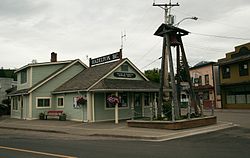Hazelton, British Columbia
| Hazelton | |
|---|---|
| Village | |
| The Corporation of the Village of Hazelton | |

Village of Hazelton Municipal Office
|
|
| Location of Hazelton in British Columbia | |
| Coordinates: 55°15′36″N 127°38′44″W / 55.25990°N 127.64547°W | |
| Country |
|
| Province |
|
| Regional district | Kitimat-Stikine |
| Government | |
| • Type | Municipal incorporation |
| • Mayor | Alice Maitland |
| Area | |
| • Total | 2.80 km2 (1.08 sq mi) |
| Elevation | 305 m (1,001 ft) |
| Population (2011) | |
| • Total | 270 |
| • Density | 96/km2 (250/sq mi) |
| Time zone | PST (UTC−8) |
| • Summer (DST) | PDT (UTC−7) |
| Website | http://www.village.hazelton.bc.ca/ |
Hazelton is a village located at the junction of the Bulkley and Skeena Rivers in northern British Columbia, Canada. It was founded in 1866 and has a population of 305 (2011). The nearby larger community of New Hazelton is the northernmost point of the Yellowhead Highway, a major interprovincial highway which runs from Prince Rupert, British Columbia to Portage la Prairie, Manitoba.
The Hazelton area comprises two municipalities (the Village of Hazelton and District of New Hazelton), three unincorporated settlements (South Hazelton, Two Mile and the Kispiox Valley), four First Nations’ villages: three of which are of the Gitxsan people - (Gitanmaax, Glen Vowell and Kispiox) - and one of the Wet'suwet'en people - (Hagwilget).
The Hazeltons are home to the Gitxsan and Wet'suwet'en First Nations.
Hazelton is one of the oldest settlements in Northern British Columbia; its European settlement dates back to 1866 when the Collins Overland telegraph went through.
Hazelton was the original gateway and staging area for the Omineca Gold Rush of 1869-73. Besides the hunt for riches, there was one other important reason to visit: it had the only proper hospital for hundreds of miles in any direction. One of its other, less appreciated, distinctions was in having dozens of roaming, foraging and howling sled dogs, as nearly everyone had their own team and many were allowed to run free. Transportation options got better in 1891 when the Hudson's Bay Company’s sternwheeler Caledonia arrived from Port Essington. Being the head of navigation on the Skeena, Hazelton was to play host to more than a dozen sternwheelers throughout the next twenty-two years.
...
Wikipedia

